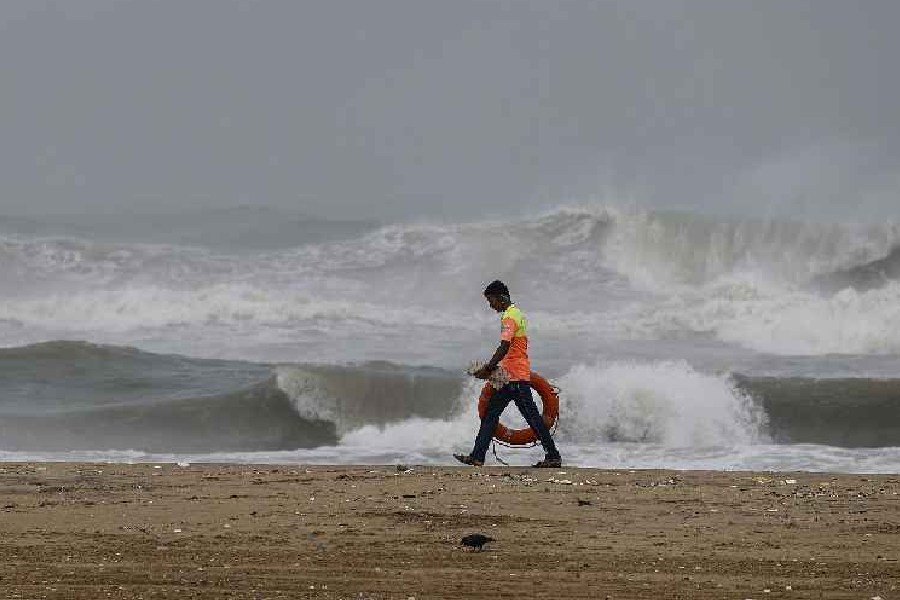Authorities in Bangladesh on Saturday launched a massive evacuation campaign to relocate close to half a million people along the southeastern coastlines as a "very dangerous" tropical cyclone is expected to make landfall in the country, threatening the Rohingya refugee camp, the world's largest.
Cyclone Mocha, one of the most powerful cyclones seen in Bangladesh in nearly two decades, is predicted to barrel towards the Bangladesh-Myanmar border on Sunday.
"Cyclone 'Mocha' is coming. We have kept the cyclone centres and taken all types of preparations to tackle it," Prime Minister Sheikh Hasina said.
The evacuation drive was taken as the maritime port of Cox's Bazar has been advised to hoist danger signal no 10 as Cyclone Mocha is likely to intensify further and move in a north-north-westerly direction.
Meteorologists said the storm's path is set to affect Bangladesh's southeastern border district of Cox's Bazar where over a million Rohingya refugees live.
Bangladeshi authorities have set up 55 shelters at Bhasan Char offshore island, where nearly 30,000 of the Rohingya refugees have been relocated from the mainland.
Bangladesh exclusively dedicated the Bhasan Char to the Rohingyas though most of them live in the mainland of Cox’s Bazar adjacent to Myanmar borders.
Most of them fled to neighbouring Bangladesh after a military-led crackdown in Myanmar in 2017.
“The district administration has turned social, educational, and religious institutions as makeshift shelters alongside 576 designated cyclone shelters in Cox's Bazar to accommodate over half a million people, deputy commissioner or administrative chief of the coastal district Muhammad Shahin Imran told reporters.
Imran said around 8,600 Red Crescent volunteers have joined a campaign asking people to relocate even as the district administration has mobilised transports to carry them to shelters.
Bangladesh's Met Office in its latest special weather bulletin said “Cyclone Mocha” continued to move to the north-northwest packing winds up to 175 kilometres per hour.
“The cyclone could cause tidal surges from 8 to 12 feet beyond the normal tide,” an official in the Met Office said.
Prime Minister Hasina warned that the cyclone could disrupt electricity and gas supplies and particularly cause water stagnation in coastal areas.
"This cyclone (Mocha) is the most powerful storm since Cyclone Sidr of 2007," chief meteorologist Azizur Rahman said.
Cyclone Sidr hit Bangladesh's southwestern coast killing more than 3,000 people and inflicting damages to the tune of billions of dollars.
On Friday, the World Meteorological Organisation (WMO) feared a storm surge of 2-2.5 metres over the weekend that was likely to inundate low-lying areas of North Myanmar as well as parts of Bangladesh where flash floods and landslides were also possible.
"It's a very dangerous cyclone and is associated with violent winds. There will be major impacts both ahead and after landfall for potentially hundreds of thousands of the world's most vulnerable people," WMO spokesman Clare Nullis told a press briefing in Geneva.
Meanwhile, thousands have been relocated from Saint Martin Island, which is situated about 9 km south of the tip of Cox’s Bazar-Teknaf peninsula.
Junior minister for disaster management Enamur Rahman said six districts stretching along the southern coastlines could witness severe tidal surges.
A journalist in Cox's Bazar told PTI that a state of calm was being witnessed in the town since the morning amid drizzles while residents of the low-lying areas of the town and its adjacent areas started moving to cyclone shelters.
He said the Pouro Preparatory High School in the town alone sheltered over 200 people from the low-lying Samity Para area of the beach town.
"Our home is in the low-lying areas while the surges are likely to inundate the area. So, we have taken shelter with my children and wife here but still, we are frightened," Shafiqul Alam told news agency Bangladesh Sangbad Sangstha (BSS).
The deputy commissioner said the cyclonic storm might cause landslides in the hilly areas of the district and works were underway to relocate people living in risky points of foothills to safer places.
UN refugee agency spokesperson Olga Sarrado said preparations were underway for a partial evacuation of the Rohingya refugee camp if needed.
The agency was also preparing tens of thousands of hot meals and jerrycans, she said.
Bangladeshi authorities have set up 55 shelters at Bhasan Char offshore island, where nearly 30,000 of the Rohingya refugees have been relocated from the mainland.
The Chattogram port has been put on the highest alert. The docked ships are being moved to the outer anchorage.
Sunday’s exams at the National University have also been postponed.
The Power, Energy and Mineral Resources Ministry said it halted supplying LNG from two floating terminals in Cox’s Bazar.
Except for the headline, this story has not been edited by The Telegraph Online staff and has been published from a syndicated feed.










